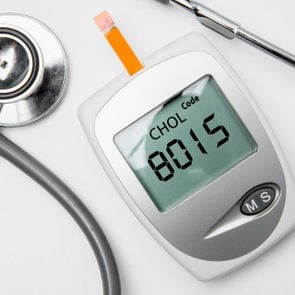4 Signs of High Cholesterol You Should Know About
Updated: Aug. 09, 2023
High cholesterol usually doesn't cause obvious symptoms. However, here are a few possible signs you should watch for—including some that you can see in the mirror.
Early signs of high cholesterol
How do your cholesterol levels feel today? Even if you knew, you might not be sure what they mean; what’s considered “normal” varies by age and sex among other factors, so for most of us there’s no way to know for certain how healthy our cholesterol levels are—even if high cholesterol is negatively impacting our health.
“People often talk about blood pressure as a silent killer, but cholesterol can be as well,” says cardiologist Donald Lloyd-Jones, MD, chair of preventive medicine at Northwestern University and the president of the American Heart Association.
That’s because there are generally aren’t any signs of high cholesterol. It usually doesn’t cause any physical symptoms or discomfort until a major problem occurs, like a heart attack or stroke. Still, certain health factors can suggest you’re at a higher risk for having or developing high cholesterol—and the health concerns that come with it.
By looking out for and understanding these early warning signs, you and your doctor can build a road map to good cholesterol management through preventive measures like regular screening, dietary changes and medication.
Get The Healthy @Reader’s Digest newsletter
What is cholesterol?
Cholesterol is a type of blood fat, or lipid, that serves some major roles throughout the body, explains Alon Ronen, MD, a cardiologist at Northeast Medical Group and the Heart and Vascular Center at Bridgeport Hospital in Trumbull, Connecticut.
It’s a building block for hormones, cells and other substances we need to function on a daily basis. Specific proteins carry cholesterol through our bloodstream, each with a slightly different purpose. Dr. Ronen says that this cholesterol-protein combination is called a lipoprotein, and while there are various forms, the main players include:
-
High-density lipoproteins (HDL cholesterol): “good” cholesterol that scavenges excess cholesterol, sending it to our liver where it’s cleared
-
Low-density lipoproteins (LDL cholesterol): “bad” cholesterol that, at higher levels, deposits the oily, leftover cholesterol into our artery walls
Why is high cholesterol dangerous?
The amount of cholesterol our body needs for day-to-day housekeeping is pretty low, says Eugene Yang, MD, chair of the American College of Cardiology’s Prevention of Cardiovascular Disease Section leadership council and professor at the University of Washington School of Medicine.
But even though the body has ways of removing extra cholesterol—like with high-density lipoproteins—these processes can’t keep up with increasingly elevated LDL cholesterol.
Instead, our body tends to deposit whatever cholesterol it doesn’t use into the lining of arteries, like those in our heart, neck, or abdomen, and even your legs. Clogged arteries have some serious health consequences.
“This then causes [blood] vessels to narrow, increasing the risk of having heart attacks and strokes,” says Dr. Yang.
Long-term research confirms this relationship. A study of nearly 400,000 people published in The Lancet found a strong link between LDL cholesterol levels and heart disease across all age groups. The researchers also found that someone’s risk of heart attacks and strokes decreases as their LDL cholesterol lowers.
This Hidden Oatmeal Benefit Could Lower Your Cholesterol, According to Research

What causes high cholesterol?
“Generally, the liver makes all the cholesterol we need,” says Dr. Ronen. But he explains that our diet has a big influence on this balance.
“Foods that are high in saturated fats and trans fats may cause the liver to overproduce cholesterol at unhealthy levels,” he says. Diets high in animal products like meats and dairy can also promote elevated LDL cholesterol.
Family history can also play a significant role. Dr. Ronen says that some genetic conditions predispose individuals to have extremely high cholesterol levels. And this can lead to artery blockages even at very early ages.
But maintaining healthy cholesterol levels is within our control, according to the experts. There are more than a handful of ways you can lower your LDL cholesterol, from changing your diet to exercising more to going on medication.
The Truth About the Cholesterol in Eggs
Are there signs of high cholesterol?
“In general, there are no physical findings that indicate your cholesterol level is elevated,” says Dr. Yang. “So unless it’s checked, you won’t know if something is wrong.”
According to the Centers for Disease Control and Prevention (CDC,) almost 30% of American adults have high cholesterol, but many people may not even know that they’re living with a life-threatening condition.
In fact, the CDC reports that only about half of people who could benefit from cholesterol-lowering medication currently take it. In another survey, the U.K National Health Service found that 79% of people didn’t know their cholesterol level.
“Unfortunately, we often see patients who have [heart attacks or strokes] and find that their cholesterol level is high and untreated,” Dr. Yang says.
Yet while there aren’t typically physical symptoms that point to high cholesterol, some signs and situations suggest a person is at a higher risk.
Skin conditions
While high cholesterol typically has no obvious physical signs, there’s one caveat.
“Certain types of skin rashes might be a symptom of very, very high cholesterol levels,” Dr. Lloyd-Jones says.
He explains that when there’s too much LDL cholesterol floating around in the bloodstream, it can start to deposit in the skin in rash-like lesions, and can even show up on your face.
These signs of high cholesterol can include:
-
Xanthelasmas, or yellow dots around the eyes
-
Arcus senilis, a gray ring around the iris of the eyes
-
Xanthomas, cholesterol deposits in the tendons
Dr. Lloyd-Jones says that these types of skin rashes are more likely to occur in someone who has had a lifelong predisposition to high cholesterol.
“If you’ve got a family history of very high cholesterol and start to develop these skin lesions, it’s critically important that you get to the doctor immediately for treatment,” he says.
9 Signs of Disease That Are Written All Over Your Face
Chronic health conditions
“There are some conditions that can raise cholesterol as a sort of side effect,” says Dr. Lloyd-Jones. If you have one of them, it’s a sign you need to keep a close watch on your cholesterol with regular testing.
He explains that cholesterol levels can unexpectedly rise in people with kidney diseases, for example. This is because kidney conditions cause people to lose protein in their urine, which the body tries to replace by creating extra LDL cholesterol.
Thyroid abnormalities and diabetes can affect cholesterol metabolism as well, leading to potentially higher-than-normal levels.
Dr. Yang adds that chronic inflammatory conditions like lupus, rheumatoid arthritis and psoriasis can raise someone’s risk for heart attacks and strokes. In these cases, cholesterol levels should be screened regularly and addressed aggressively if they get too high.
“Patients with HIV are also at an elevated risk of heart attack and stroke, and the medication they use to treat their HIV often raises cholesterol levels,” says Dr. Yang. “We tend to be more aggressive in not only screening but treating them.”
Family history
Dr. Yang says that about one in 250 people have a genetic mutation that causes their cholesterol levels to be naturally higher than average.
According to the Arkansas Medical Society, this condition—called familial hypercholesterolemia—puts someone at 100 times the risk for cardiovascular death due to the artery-clogging effects of high cholesterol levels.
If you have this condition, consider it a flashing sign you need to keep a close eye on your cholesterol levels.
34 Things Your Parents’ Health Reveals About You
Breathing problems
Have you been experiencing chest pain or shortness of breath? Both are potential warnings of an artery blockage due to high cholesterol levels, says Dr. Yang.
Because these signs of high cholesterol can mean you’ve already started to develop heart disease, it’s important to seek urgent medical attention to lower your risk of experiencing a heart attack or stroke.
Other risk factors
Other situations can enhance someone’s cholesterol risk as well, according to Dr. Yang. He says that certain groups of people may require more aggressive monitoring or treatment to keep their levels in a healthy range, including:
-
Women who have pregnancy-related disorders, including preeclampsia (high blood pressure)
-
People of South Asian descent, a group that carries a greater risk of heart disease
-
People with prediabetes
One Woman Was 35, Healthy, and Pregnant Until a Heart Condition Threatened Her Life
When to have cholesterol levels checked
Some signs can point to a greater risk for high cholesterol—and the potential heart disease it can cause.
“But we just don’t know unless we measure it directly,” says Dr. Lloyd-Jones.
That’s why clinical practice guidelines (and the CDC) recommend every child get a cholesterol screening through a blood test between the ages of nine and 11.
“What we want to do is find those children—about one in 250—who have genetically very elevated levels of cholesterol,” he explains. “[They] need to be treated very early in life. Otherwise, those are the people who could have heart attacks in their 20s and 30s.”
But he says that many kids will still slip through the cracks. So doctors also recommend that everyone gets screened when hitting young adulthood, between the ages of 17 and 21.
“After that, if you’ve got cholesterol levels that are appropriate for your health status, then we usually recommend [testing] every five years throughout adulthood,” Dr. Lloyd-Jones says. “Once it’s determined that you have extra risks, we do start to accelerate that, particularly once we put you on medication.”
Doctors recommend that people taking cholesterol medication get their levels checked at least every year. This is to make sure that you’re on the correct dose and that the drug is doing its job: reducing your risk for heart attack and stroke.
The Important Blood Test Your Doctor Should Be Doing—Your Heart Might Need It

What is a healthy cholesterol level?
A cholesterol test measures a few different components: your total cholesterol, HDL cholesterol, LDL cholesterol and triglycerides, a type of fat our bodies use for energy.
But when it comes to what numbers are optimal for you, context is key. Dr. Lloyd-Jones explains that there are average values doctors consider to be a healthy cholesterol level. But if a person has risk factors for high cholesterol, those figures might be way too high.
In general, adults aim for the following targets:
-
Total cholesterol: less than 200 mg/dl
-
LDL cholesterol: less than 100 mg/dl
-
HDL cholesterol: 50 mg/dl or higher for women; 40 mg/dl or higher for men
-
Triglycerides: less than 150 mg/dl
Still, cholesterol goals are dependent on someone’s health situation. For example, Dr. Yang says that for people in a high-risk category—like those with heart disease or diabetes—the target LDL cholesterol level should be below 70 mg/dl.
“That’s a firm recommendation in the U.S. guidelines,” he explains. “But the European guidelines are even more aggressive.”
In its 2019 guidelines, the European Society of Cardiology set its LDL cholesterol target for high-risk patients at less than 55 mg/dl.
“In general, most cardiologists believe that lowering the LDL [cholesterol] as much as possible confers a greater benefit,” Dr. Yang says. “But it’s based on your personal risk.”
It’s also based on your sex (men have a slightly lower HDL target than women) and age. Children, for instance, have a total cholesterol goal of 170 mg/dl and an HDL goal of 45 mg/dl.
That’s why the experts say it’s essential to work with your doctor to understand what targets are best for your health. From there, keep an eye out for select signs of high cholesterol. If you can test and treat early, you can form a management approach that will promote long-term heart health.
For more wellness updates, follow The Healthy on Facebook, Instagram, and Twitter. Keep reading:


















